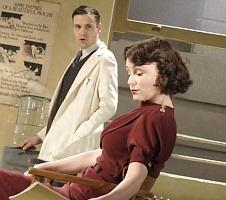Rocket to the Moon
As the thermometer rises inexorably in the heat of a New York summer, so does the emotional temperature in the office of dentist, Ben Stark. It's the 1930s and the depression still looms like a giant black bird stretching its wings over the city and economy. Ben earns a mere $60 dollars a week, but fares better than his fellow dentist and office tenant, Cooper (Peter Sullivan), who has to resort to selling his blood to pay Ben his rent. In my experience, at least, it's usually patients who have to sell blood to pay dental fees - obviously times have changed.
The play starts with Ben and his wife, Belle, discussing a possible office move to another neighbourhood. Keeley Hawes's Belle is a woman who not only knows her own mind, but is also not to be trifled with, and obviously used to getting her own way. The office move is knocked on the head, particularly because Belle's father has a hand in the idea - and Belle doesn't speak with her father. "Being a dentist's wife is no joke", she says, but it also appears it's not a lot of laughs being her husband. Mild-mannered Ben takes all in his stride until, that is, his new secretary-cum-assistant, Cleo, offers him a chance to 'take a rocket to the moon' and change his life forever. That idea is initially suggested to Ben by his father-in-law, Mr Prince, a cavalier and hugely successful entrepreneur who nonetheless harbours a desire to be an actor. His ambitions, though, are sidelined as his attention also becomes focused on Cleo's naïve charm and beauty.
I wasn't sure quite what to make of Jessica Raine's clumsily awkward and naive Cleo during the first few minutes. But here's a situation where patience reaps its own rewards, as does trusting the actor. As the play moves on and we learn more about her, the characterisation becomes strikingly clear and the result is a compelling performance. Almost 20, Cleo lives in a cramped flat where 8 people share the meagre facilities. She longs for the space to be herself, and dreams of success. "Happiness is everything", she says, and she seeks it desperately.
Joseph Millson, as Ben, describes a man who longs to change his life, but lacks decisiveness. Nicholas Woodeson ably convinces as the roguish Mr Prince whose flair for making money is matched by his conversational ability. And there's excellent support from Sebastian Armesto as Frenchy, the doctor from a neighbouring office, who acts almost as observer and interpreter of the events unfolding in the office.
Anthony Ward's impressively authentic set, though spacious on the interior, provides a claustrophobic atmosphere with neighbouring office blocks pressing in on almost every side. There's great attention to detail with even a large stain on the office ceiling signifying the austerity of the times. And when the summer heat breaks, the rain pours down through the gaps between the buildings, cooling not only the city, but the emotional intensity generated in the dentist's office.
First produced in 1938, the play not only shows the desperation of economic deprivation as embodied in the character of Phil Cooper (excellently played by Peter Sullivan), but also explores the nature of love and the American desire to achieve. There's not much in the way of action here. What matters is the dialogue and the development of the interaction between the characters. Angus Jackson's pacey and thoughtful direction not only maintains the momentum, but also keeps us dangling on a thread intrigued to know what the final outcome will be. However, as the story unfolds, it's not hard to predict how things will work out, given the nature of the characters involved. But that doesn't matter so much, because the real enjoyment here is in Clifford Odet's writing which is funny, acutely observed and incorporates a rich vein of metaphor.
"Mildly underwhelming 1938 drama."
Fiona Mountford for The Evening Standard
"Although the play is clumsily structured, Odets captures the quality of desperation that haunted Depression-era America."
Michael Billington for The Guardian
"There are moments here of the acerbic New York repartee that was his great gift, but not nearly enough of them. For much of its length the show merely plods along, telling a banal story at tortuous length...this play about a dentist proves only marginally more entertaining than several hours of root canal work. "
Charles Spencer for The Daily Telegraph
Originally published on
